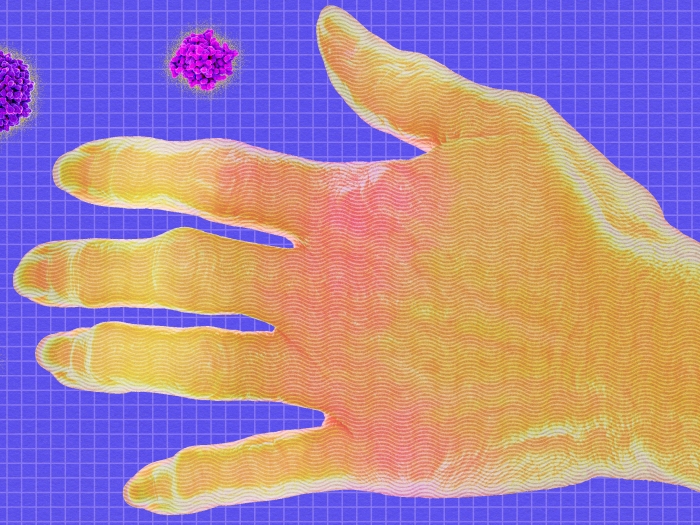A Michigan Medicine dermatologist shares everything to know about heat rash symptoms, prevention, treatment and how to discern it from other skin conditions in disguise.
3:15 PM
Author |

If you spend the day under the sun and notice you're turning red, sunburn might not be the culprit, says dermatologist Jennifer Mancuso, M.D. With temperatures rising and sun shining, you could get a heat rash.
LISTEN UP: Add the new Michigan Medicine News Break to your Alexa-enabled device, or subscribe to our daily updates on iTunes, Google Playand Stitcher.
Similar to sunburn, a heat rash, also known as 'prickly heat' or miliaria, is a red rash on the skin. But unlike sunburn, heat rash can cause small, itchy, fluid-filled bumps on the skin, and it can be skin that was never even exposed to sunlight.
The rash is caused by heat and tends to present around the hair follicles in areas with increased sweating or friction, like in skin folds. This includes the underarms and groin, and places where clothing causes friction, particularly on the back.
Preventing heat rash
Hot, humid weather is a prime culprit. When sweat glands or pores get clogged, sweat is trapped underneath the skin. The inflammation can create an itching or burning sensation, but heat rash doesn't always present with these symptoms.
Always take a picture of your rash, because there's different skin conditions that do a great job disguising as heat rash.Jennifer Mancuso, M.D.
It's important to note that heat rash can be brought on in an indoor setting as well. Mancuso, a clinical lecturer in dermatology at Michigan Medicine, says this condition is also seen in patients who are sick in the hospital and lay on their back for extended periods of time. Keeping the skin cool and avoiding hot, humid conditions is beneficial in keeping heat rash at bay.
She says air conditioning, wearing loose fitting clothing, and changing out of sweaty clothes frequently all can help avert blocked sweat glands. Additionally, using an anti-perspirant deodorant in the underarms but also in other skin folds (groin folds, thighs, under breasts, etc.) can be helpful to decrease sweating.
MORE FROM MICHIGAN: Sign up for our weekly newsletter
Likewise, there are factors that can make someone more prone to get heat rash. Those with hyperhidrosis, or excessive sweating, are more likely to develop the rash. Someone with sensitive skin or another skin condition is also at a potentially greater risk.
Distinguishing and treatment
"If you see a dermatologist and tell them you have a heat rash, they will probably want to know more about the rash and even see pictures of it," says Mancuso. "Always take a picture, because there's different skin conditions that do a great job disguising as heat rash."
Conditions commonly mistaken for heat rash:
-
In older adults, Grover's disease is worsened by heat and occurs on the back and chest.
-
In younger children, eczema can be aggravated by heat.
-
Some people have physical urticaria, which generates hives from heat, sun, sweat or water exposure.
-
Polymorphous light eruption is a true sun allergy and can be brought on by varying amounts of light exposure.
If you think you have a heat rash, Mancuso says wearing loose-fitting clothing aids in quick resolution within a few days.
"For severe itching, anti-itch lotions such as Sarna or other topical steroids like hydrocortisone can be used," she adds.
If these treatments don't help or cause worsening of the rash, it's worth seeing a doctor for further treatment or to be evaluated for other types of rashes, as the rash could be a recurrent problem. Take pictures of the rash in case it goes away before your appointment, and remember to protect yourself and your skin whenever you're exposed to sunlight.

Explore a variety of healthcare news & stories by visiting the Health Lab home page for more articles.

Department of Communication at Michigan Medicine
Want top health & research news weekly? Sign up for Health Lab’s newsletters today!





